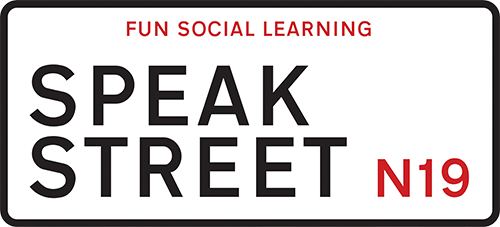
SPEAK STREET
This is an organisation founded by Joanna Bevan 5 years ago: its purpose is to provide free ESOL learning in a fun context for overseas visitors to the U.K.
Joanna leads the Tuesday morning English session at ICFRM, assisted by the 2 ESOL teachers there plus a large number of volunteers.
Students are placed into 3 groups (beginners, intermediate and advanced) and work on materials specific to their ESOL level, supported by the volunteers.
A typical lesson consusts of 3 stages: 1 (Lead in): Matching words to pictures. 2: Focus on a specific aspect of grammar (e.g. adjectives & adverbs). 3, Reading a short text: focusing on pronunciation and vocabulary, followed by a brief group discussion about the article or story. Some of the volunteers regularly produce the lesson materials for us to use in class.
Speak St. also organises an annual Xmas party at the ICFRM. There are also regular ESOL classes on Thursdays and Fridays at Euromonitor (Clerkenwell), the Skip Garden (Camden) and the Wellcome Collection (Euston). There are often also monthly visits to museums and exhibitions (e.g. Tate Britain, Museum of London, Wallace Collection etc.)
The academic year ends each summer with a tour of Kenwood House, Hampstead, followed by an outdoor picnic and games in the grounds.
Last but by no means least, for the past 2 years, I’ve been helping out with the Speak Street Friday afternoon weekly conversation class, held in Islington Central Library from 1.30 – 2.45 p.m.. This is attended by around 15 students: some of them come from ICFRM, whereas other find out about the class on “Meet Up”. Free ESOL classes are very hard to come by! The students work at 3 different tables, according to ability, where they are assisted by the 4 or 5 volunteers usually present.. (One volunteer travels in all the way from Cambridge once a fortnight!) The lesson follows a similar format to the Tuesday morning lesson, using texts from magazines and newspapers (e.g Time Out is a free weekly that is very useful for discovering colloquial expressions and idioms used in everyday English). The reason why the students and volunteers enjoy this class so much is that the atmosphere is very relaxed and informal: it’s ok to make mistakes here!!! It’s not about learning grammar rules; instead it encourages students to get talking and practise their conversation skills. It’s a particularly enjoyable finish to the week for me.
At the final session of each term, Joanna organises a competition: each student is asked to speak for one minute on any subject of her/ his choice. At the end, each student writes the name of the best speaker on a piece of paper and hands it to Joanna. The student with the most votes is presented with a small cup and a medal, though everyone gets an appreciative round of applause all the same. It’s a really fun activity for volunteers and students alike!
Once again, it is extremely rewarding to help individuals to improve their English language skills.
You can find more information about Speak Street by following this link:
So, yes, there is life after 40 years working in the Post Office! (I’m told that you get less than that for murder!)
Thank you. Gary Kenneth Watt – voluntary ESOL support assistant.

Social